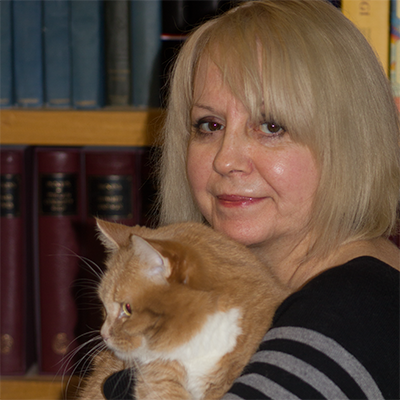 The Potato Eaters
The Potato Eaters
Her back is to us, but her head tilts
toward the plate filled with creamy light
and jacketed potatoes: the aureate center,
the corolla of this domestic tableau.
A touch of Hansa yellow tempts us to smell
butter, but it could be merely the amber
glow of the ambergris flame, focusing
our eyes with the child's to the fat spuds.
The earth scent of potato permeates,
merging whale oil with salt-sweat as
it mingles into shades of viridian
and even cadmium. Look at the woman:
how it rouges her face, how casually
she wears a flush of tulip on one cheek.
She wears a flush of tulip on one cheek,
but no one notices, or how her fork
poised to land on the central dish,
hovers like her eyes—waiting, anxious,
poised and luminous—with what?
Love? Fear? Her two dimensions expand
as her life is framed and frozen.
It's a trick, and yet she was real—never
expected to travel to Paris, Rome, Tokyo,
New York. Never expected to be scrutinized,
idolized, and hung in Amsterdam.
Never expected she would outlast so many
root crops, burnt umber eyes pinned on
the man who stares at another woman.
The man who stares at the other woman
looks concerned—or is he merely tired?
Impatient? The girl's father? The rouged
woman's mate? Is he displeased, or merely
waiting for tea as his fork rests lazily
on the main course? Is the older woman
his mother? Seems likely as they wear
the same nose, the same leathered skin:
rough and tan as a mature spud's jacket. Yes,
he resembles the humble root he hoes:
flat hat tinged with an absinthe glaze
that poisons his hand as well—the family
Solanacae has deadly relations: what of
the old woman, back bent to her task?
The old woman, back bent to her task,
pours a steady stream of tea into cups.
Attentive to her chore as the child
to her meal, neither hat nor cheek have time
for crimson blushes. She is past that.
Her gown is heavy and she moves slowly,
resembling an old brindle cat, past prime.
Arthritic, domestic—her brow furrowed
with tabby markings, she looks content
with familiar smells, familiar scars:
the familial group. A smile curls slyly
in the corners of her mouth as she
takes notice of something said by
the old man who presents her with sugar.
The old man who presents her with sugar
has just spoken. Here, he has just said,
or has he called her name, or a soubriquet?
Perhaps he is speaking still—his face is merry,
is he making a jest? Is this why she smiles?
Patiently, he proffers the copper bowl
and waits, jacketed in a brown blanket
like a mature potato: that commodity
always on the edge of thought, that center
around which their lives turn, that root
and future of their days. The artist watches,
sketches, savors the young girl as she leans
toward the plate filled with creamy light:
her back is to us, but her head tilts.
This poem previously appeared in Prairie Schooner.








